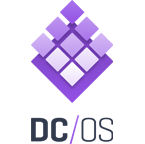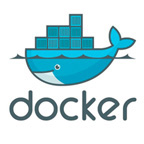APPLICATIONS
Develop Document Management, Business Workflow Applications in a performant and scalable fashion.
SECURE ACCESS & FULL CHANGE AUDITING
Ensures Versioning, Upgradabilty, Change Auditing, Security and much more.
MULTI PLATFORM
Available for PC/Mac/Linux, modern Browsers and mobile Devices
FAST ITERATIONS
Developed to split the dependency chains inherent in standard development.
STANDARDS
Based on robust industry infrastructure services and open standards
HIGH PERFORMANCE
Backend Performance is optimized for horizontal scale-out
Forms
Effortlessly create forms
IRIS makes it super easy to create forms. It allows you to think just about the content and the organization and order.
Designing a form to gather and therefore structure data is about
thinking
It is best created by someone in
IRIS also allows iterating on a forms content without developer involvement to ensure it actually delivers the expected value and improve on it.
Documents created based on a specific version of a form will remain the way they were by default. No automatic upgrade adding fields or changing structure will be done automatically. It is possible of course but most of the time it just doesn't make sense.
Just because e.g a case form suddenly requires a new field doesn't mean pre-existing data should suddenly also get this field as if it had always been there. In standard development this is often the case though. Updates often cause huge data upgrades to make existing data conform to new forms and bog down the servers for the duration of this upgrade.
IRIS is more aligned with how forms used to work in the real world, where it is possible to make some changes without external overhead. Getting agreement on changes inside a business often already requires consensus which includes internal processes and getting developers on board for any kind of change just slows everything down.
Forms

History
Keeping everything
All documents created using forms in IRIS keep a full history automatically. Thus any document can be inspected at any time to show a list of all previous states the document was in.
When the history of a single document isn't enough, an entire tree or group of documents as they appeared together can be snapshotted and kept for future reference. This isn't strictly necessary since it could always be reconstructed from the history of each individual document, but this way a full tree of documents can be used to offer user features such as signing off on a set of related changes.
Integrated Search
Finding made easy
All recent version of all documents are automatically full-text indexed. We use the most advanced full text search engine available this side of Google to allow to search of everything.
The highly structured nature of form based data gives us an extra advantage to allow not only searching but also perform aggregations and faceting.
Since full-text search is integrated from the outset it will only search through data that the specific user actually has access to.
Designs
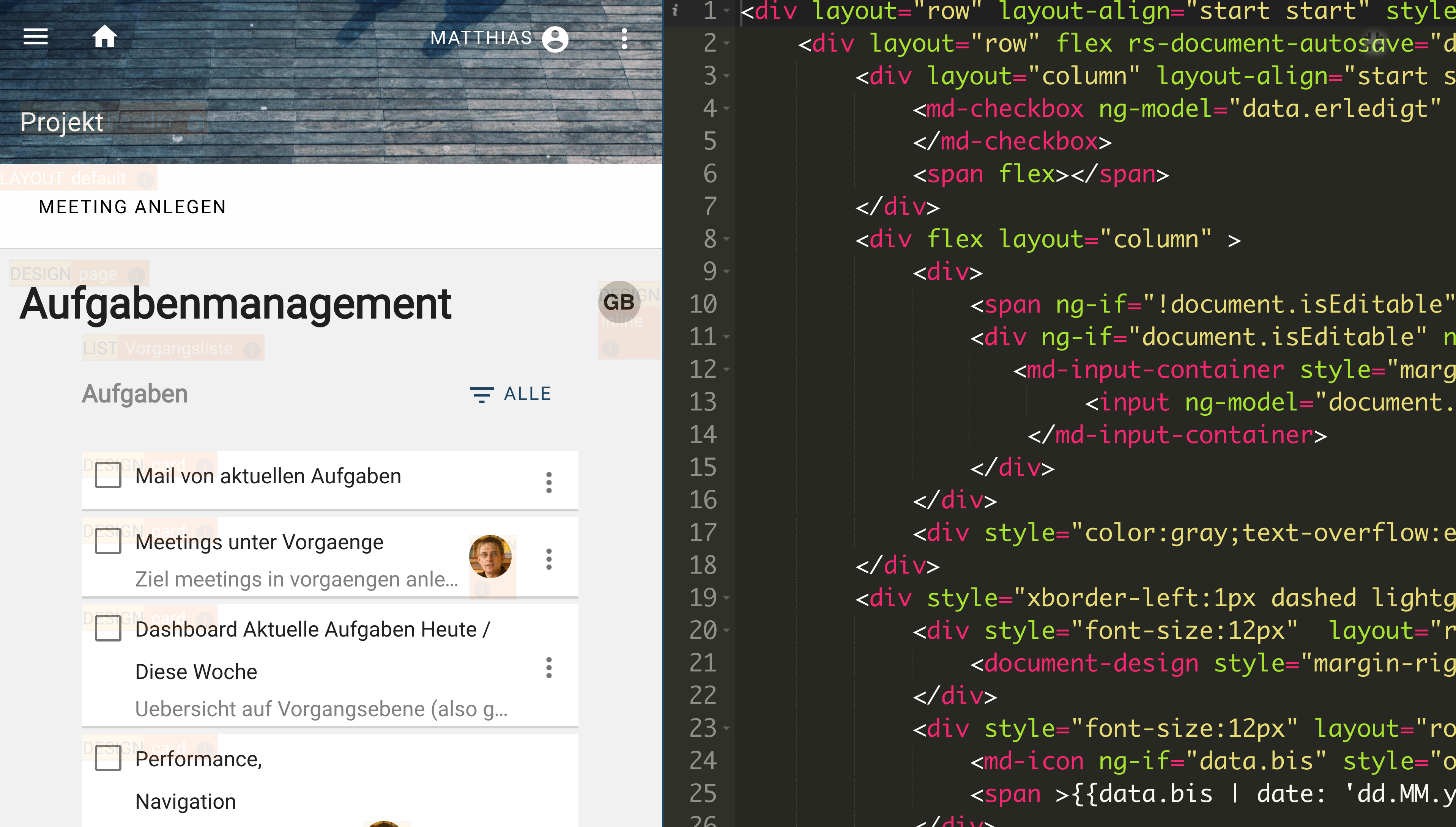
Designs
Make it beautiful
Due to the pretty default styles included in IRIS most forms can be used right away, but for the 20% of forms that users actually spend at least 80% of their time on a designer can make it beautiful.
The tools to design forms and content are built right into IRIS and based on HTML5 / CSS and give immediate feedback
Most importantly a Designer can design actual live data already entered into the system and even create new example data with the default UI IRIS provides for all data.
Fine-tuning the Design is often performed in a session alongside actual Users or Stakeholders. No need for operations or developers to get involved.
Deployment
Allow Change
Changes to Forms,Designs and all the other parts of IRIS require a Change-Management Strategy.
In a production system no application level changes are allowed by default. But IRIS is capable of taking almost zero-overhead copies of the production system in constant time. That means business can allow many more people to experiment and propose changes.
Users without the Right to deploy directly, can now demo their Change and propose it for deployment to the team responsible.
And once its time to perform the deployment of Changes into the production system a staging system is created with most up-to-date data and kept in sync with the production machine. Changes are imported and can be verified. When its time to go live, the changes go into production with basically no downtime (even no downtime is possible).
IRIS is designed to allow many small changes quickly instead of bulk changes every month.
Backup
Usable Backups
Important data must be backed up, but most backups strategies are incomplete. They take too long or put too much load on the production machine. Also the backups are often not verifiable without a huge amount of work.
Our standard installation of IRIS (hosted or on-premises) use ZFS to take continuous point-in-time snapshots of the entire production system with practically no overhead and transport these to secondary servers. These machines are complete copies and can always be brought live or be be made available under a different name.
The amount of extra space needed to get full and differential backups is just the total deployment size * number of backups + number of bytes changes between snapshots.
On top of that, all data and all differential snapshots are block per block cryptographically signed to ensure data integrity on top of the underlying storage mirrors.
Sensitive Data
Ensure Access for only the right Users
Not every User should be allowed to see everything in the system even if they do have access in principle. For example Technical Support team members or Designers should be allowed access to documents but not know see actual credit card information or Customer names.
In IRIS form fields can be marked confidential and these data in these fields are not visible and not searchable unless necessary. In a deployment system these fields are normally blacked out for example.
Data Access Security
Predictable Access
Securing data is all about Trust in the configuration. When its not easily possible to predict what a User can do, or why a User can or cannot access something it is unpredictable.
IRIS follows the same security philosophy as it has been in the real world. We use Locks and Keys.
Since documents created in IRIS are stored in a strong hierarchical order a Lock can be placed on any subtree. For example a folder called 'Marketing' can be locked using a Lock called 'Marketing'. Only Users with the appropriate Key to unlock this specific Lock can now even see any data in there. This includes global Full-Text searches
Having been assigned a key gives a User access to anything locked with that key an contained inside. With a locked room, having the correct key allows entering it. Just having the key though does not give you the right to take away anything or use the phone. Therefore a given key is often combined with a list of Rights the User is allowed to perform which are normally grouped into Roles. In the real world an assistant might be allowed to enter the managers room, but not use the computer inside or even take away anything.
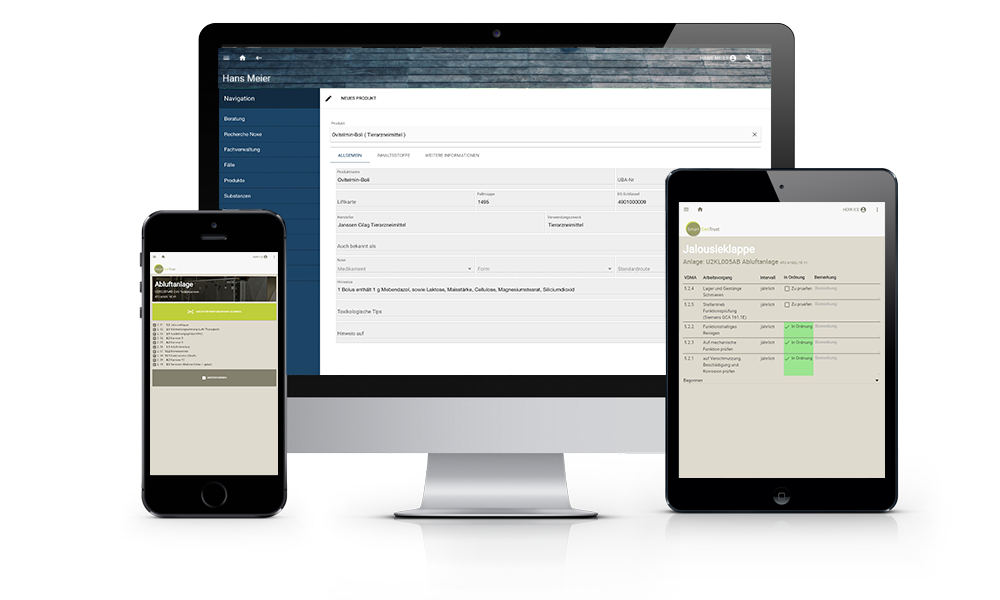
Software that adapts to inevitable change
An organization only remains competitive when it can change. Standard software is too inflexible and truly custom software is not generic enough.
- Changes forms without developers in the loop
- Clients for Windows 7,8,10 | OSX | Linux
- Hosted | On-Premises Hardware
- Connect data to SAP
- Multi-language Support ( including RTL )
- Mobile support included ( Android, iOS, Windows 10 )
- Simple licensing
Sharing
Secure Sharing
Standard software often allows bypassing this security mechanism when data is supposed to be shared to outside groups. This is very easy to implement for developers, but can make the entire system become unpredictable. Now validating access has to account for two different access vectors. With two different ways of inspecting and managing them.
IRIS allows sharing just like sharing would be performed in the real world. Either a copy of the shared data is made and put into a shared area, or the data is moved there.
Copies can also remove sensitive information automatically so that sensitive information is not accidentally leaked.
Scalability
Small Departments to Giant Installations
Modern data entry applications must scale quickly and easily from a handful of Users to tens of thousands of Users and beyond.
Scalability of this magnitude is not easy to achieve. IRIS has been architected from the ground up to allow scaling of all aspects for a number of use-cases.
For example writes and reads to the system are scaled differently and both can be sharded across as many machines as necessary. And with the advent of Docker and standardized container technology this will soon be made easier even across different technology stacks.
Extensibility
Controls
When designers need more than just HTML to make their vision come true, IRIS allows importing standard javascript controls through an integrated package mechanism.
All packages are versioned and cryptographically signed by the author and importing them can be made to follow a security workflow to ensure only validated controls make it into production. In standard software this is either forgotten or all controls always have to be done by the original development team causing delays.
Services
Integrating with external services often requires server side code. This is handled by services which are also versioned and are also cryptographically signed by the author with the same workflow mechanics controls follow.
Services can run in their own virtual machine and also require an Account to query or change data.
Workflows
Easy to understand
Every business application automatically defines a flow of work. Often though these are hidden away in the code that only developers have access to.
Some more advanced systems have tried to integrate large workflow engines to assist in defining these workflows.
IRIS is following the most flexible system ever invented and proven in the real-world. The system used by people in organizations before computers where invented. It allows for If-Then rules on any change in the system.
Big workflows are thus not defined beforehand and then attempted to be put on top of the existing structure, but inherent of the data-model. Whenever data changes an 'If' can be evaluated and cause an 'Then' action.
Features
Iris allows creating forms to gather data quickly and makes it easy to concentrate on the important aspects
Changing forms should not be done by developers but by people understanding the business and Iris enables that.
Customizable Forms
Often customers require small changes to make the standard solution fit perfectly. With irisMed this is possible without disabling updatability
User Friendly
Having access to the most up-to-date User Interface technologies gives us the possibility to achieve great design and great usability.
Integrated Auditing
All changes performed against the system from user or business rule alike is automatically and persistently audited
Outstanding Support
We offer support every step of the way. From Project Management, to User Training and Ongoing Support after installation.
Integrated Version History
irisMed keeps versions of all documents automatically. Old documents can be retrieved exactly as they looked whenever a change was made.
Continuous Updates
All supported solutions receive regular baseline updates for security and stability
Hosting
The right platform
Our hosted and standard on-premise deployments have a well optimized operation stack. We carefully chose all aspects underlying IRIS to support its vision and architecture.
IRIS is architected in a scalable microservice architecture which lends itself towards containerization. For standard business or enterprise installations a 3 machine cluster setup (which is what our hosted offering includes at a minimum) is perfect. We offer this in our hosted and default on-premises solutions.
Sometimes though, the scalability requirements are more demanding. For cases like these, we suggest and support DC/OS, optimally deployed on a self-hosted or cloud-hosted SmartOS/Triton base infrastructure to gain the perfect reliable and scalable setup.
These kinds of setups require operations staff from us or by the customer, but can handle a diverse load of many applications and provide enormous data storage and compute capabilities. It also means different kinds of workloads can share computing and storage capacity alongside IRIS.
If you want to see more and create solutions with us similar to what we have created for our partners today



